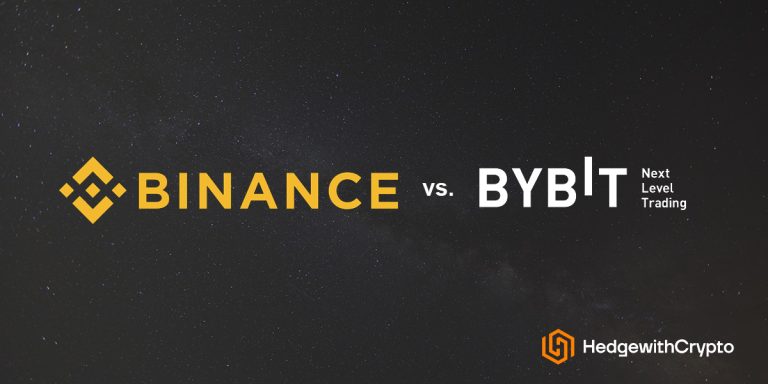We may earn a commission from links on our site, but this doesn’t affect our reviews. Learn more.
Hedge With Crypto is an independent publisher that provides objective and free content. Articles on our site may include links to our partners. If you click on these links, we may earn a commission. However, our editorial content remains unbiased, reflecting our own opinions or the general information available. For more information on our company policies, read the Affiliate Disclosure, Privacy Policy, and Terms & Conditions.
ByBit vs Coinbase
Hedge with Crypto aims to publish information that is factual and accurate as of the date of publication. For specific information about a cryptocurrency exchange or trading platform please visit that provider’s website. This information is general in nature and is for educational purposes only. Hedge with Crypto does not provide financial advice nor does it take into account your personal financial situation. We encourage you to seek financial advice from an independent financial advisor where appropriate and make your own enquiries.
TABLE OF CONTENTS
ByBit vs. Coinbase – Quick Verdict
ByBit and Coinbase are excellent cryptocurrency exchanges trusted by millions of customers. Each platform has a reputable development team, a near-flawless track record with security, and hundreds of assets available for purchase, sale and trade. Ultimately, Coinbase is the superior platform for buying crypto with money. In contrast, ByBit is better suited for crypto margin trading and other advanced trading features.
In short, beginners and longer-term investors will be better suited to Coinbase, whereas more experienced crypto traders will benefit from ByBit.
Visit the website to start trading with Bybit and Coinbase.
ByBit vs Coinbase Compared
| ByBit | Coinbase | |
|---|---|---|
| Website |

|
|
| Promotion | 0% trading fees for 30 days (spot only) | $5 BTC bonus (USA only) |
| Fiat Currency | USD, EUR, GBP, AUD, CAD, +125 Others | USD, GBP, EUR, CAD, SGD, NZD & AUD |
| Supported Cryptocurrency | 331 (608 trading pairs) | 241 |
| Max. Trading Fee | 0% (spot), 0.06% / 0.01% (futures) | 0.4% (maker), 0.6% (taker) |
| Overall Rating | HedgewithCrypto Score 4.8 / 5 We provide an overall weighted average rating out of 5 stars. Our ratings are based on objective criteria like the ease of use, fees, deposit methods, customer support and availability. Our reviews are not influenced by 3rd parties. Click here for further information about our rating methodology and a full list of categories we review against. Visit ByBit |
HedgewithCrypto Score 4.7 / 5 We provide an overall weighted average rating out of 5 stars. Our ratings are based on objective criteria like the ease of use, fees, deposit methods, customer support and availability. Our reviews are not influenced by 3rd parties. Click here for further information about our rating methodology and a full list of categories we review against. Visit Coinbase |
| Review | Read our full ByBit Review | Read our full Coinbase Review |
ByBit Overview
Bybit was founded in 2018 and is headquartered in Singapore as a margin and derivatives trading exchange. The platform has grown rapidly and boasts over four million registered users. The exchange supports various features intended to appeal to traders, such as futures/perpetual contracts, stop-loss/stop-limit order types, and a sleek mobile app for managing portfolios on the go. There are even zero fees when buying crypto and a referral bonus for new Bybit traders.

Bybit is renowned for its trading hub, which integrates one of the world's best charting platforms, TradingView. Traders can choose from hundreds of indicators to complement their trading experience. In addition, the interface supports a live-updating order book, volume/liquidity information, and a lightning-fast price feed. It also features one of the best margin platforms for crypto derivatives and futures trading.
In addition to its trading qualities, Bybit offers a reasonable earning feature that allows investors to passively earn rewards. Best of all, the team frequently offers short-term promotions that can boost potential earnings by a significant amount. Bybit also supports an excellent crypto P2P marketplace and a developing NFT ecosystem.
ByBit Pros:
- One of the best trading interfaces on the market
- Earning program promotions can lead to very high interest rates
- Deep, global liquidity resulting in low slippage
- Low fee platform for spot and derivatives pairs
- Excellent and responsive mobile app
- Investors can trade margin with up to 100x leverage
ByBit Cons:
- Lack of support for depositing fiat currencies
- Unregulated in the vast majority of countries
- Platform is targeted towards advanced users only
- User interface can feel a little cluttered
- Does not have lending and borrowing products
Coinbase Overview
Coinbase was founded in 2012 and is headquartered in San Francisco, USA. Coinbase is one of the oldest and most well-established crypto exchanges with over 100 million customers. This catapults it into the top echelon of cryptocurrency platforms based on user activity and registered accounts. A significant reason for its popularity is Coinbase’s design – the platform is intended for a general audience. It offers a streamlined interface compared to other exchanges and is one of the easiest ways to buy crypto. Coinbase also features a built-in wallet for each user and is one of the more secure crypto storage solutions available. There is a wide array of digital assets for purchase, sale, and trade.
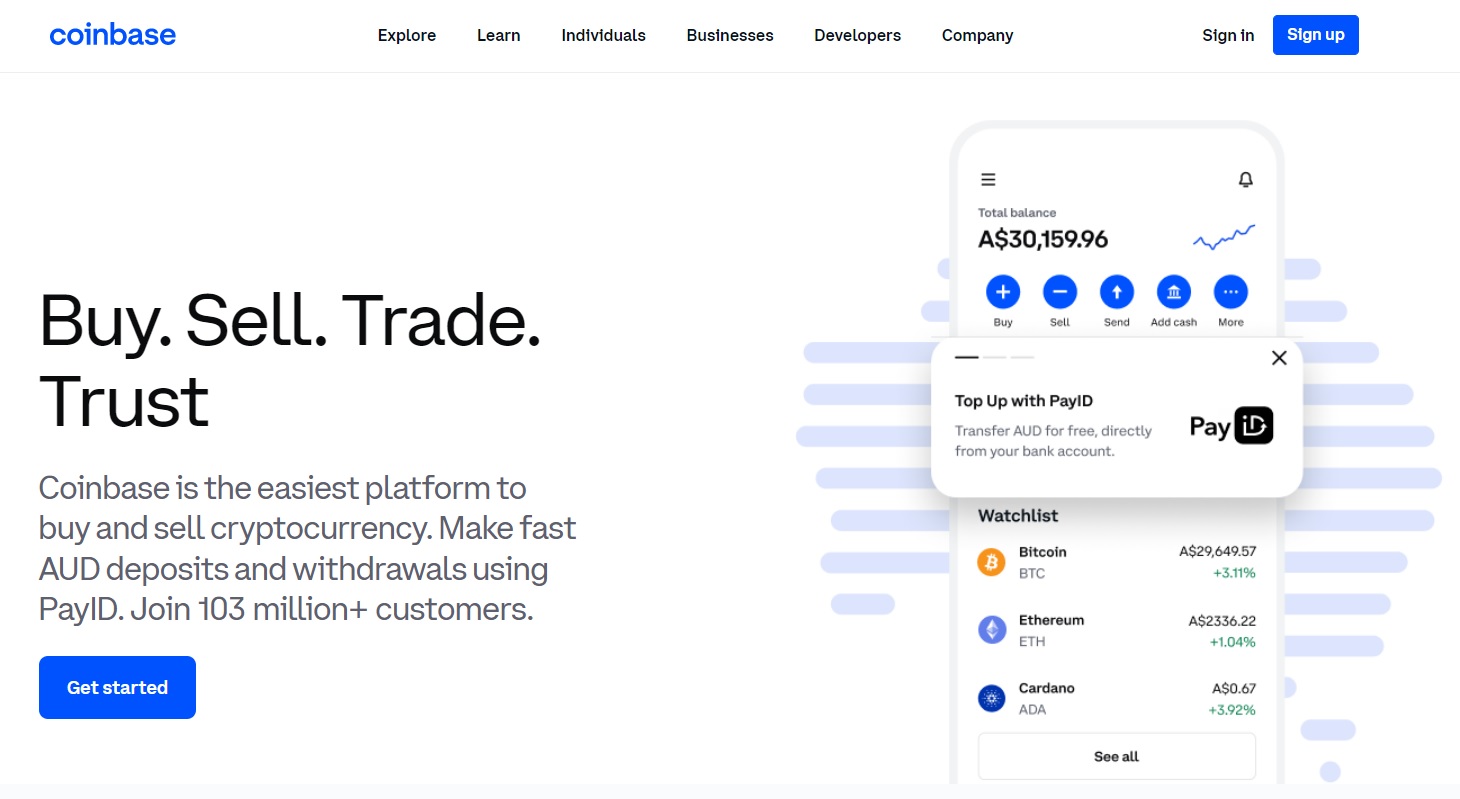
In over a decade of running a renowned cryptocurrency business, Coinbase has encountered very few security issues. The platform has a solid customer support team and has only been compromised once – in 2021, thanks to a problem with Coinbase’s authenticator. Coinbase is quite limited in terms of advanced features for trading and navigating the blockchain. The earning program is solid but lacks some more popular cryptocurrencies, and its trading fees can rack up rather quickly.
Coinbase Pros:
- Reputable and trustworthy company
- Very easy-to-use interface, highly recommended for beginners
- Integrated storage for user wallets (and a third-party, independent wallet called Coinbase wallet)
- Fiat deposits supported for U.S. dollars, Euros, Canadian dollars and British pounds
- International exchange with excellent global liquidity
Coinbase Cons:
- More expensive fees than competing exchanges
- Some are restricted from some subsidiary features depending on location
- Few advanced trading options (although users can switch to Coinbase Pro)
- Customer support, while helpful, is notoriously slow
- Small earning hub with only a few supported cryptocurrencies
Comparison of Features, Products & Services
Bybit and Coinbase have quite different approaches to crypto trading and management. Bybit is one of the best alternatives to Coinbase for traders due to its sophisticated margin and derivatives trading interface. On the other hand, Coinbase’s primary focus is ease of use and accessibility. This should be kept in mind when comparing Bybit versus Coinbase.
ByBit vs Coinbase: Supported Countries
A huge advantage of Coinbase is that it’s a U.S.-based company that caters to U.S. residents. This is a pro, as many exchanges from other regions struggle to navigate America’s tight crypto regulations. Generally, Coinbase supports 100+ countries with excellent coverage in Europe, Asia, Oceania, and North America. However, some countries are not supported by Coinbase or don’t have access to the full suite of Coinbase’s services, including Singapore and Australia.
On the other hand, Bybit is available for use in most countries globally. However, because the exchange is largely unregulated, certain major nations have banned its use. As unregulated platforms have no (or minimal) KYC requirements, Bybit is illegal based on certain financial legislation.
Related: Can you use ByBit in the USA?
Winner: Coinbase.
Coinbase is the clear winner for its wide availability worldwide. It is supported in many more countries than ByBit including the United States. While ByBit is also widely available, users from the US are not allowed.
ByBit vs Coinbase: Supported Deposit & Withdrawal Methods
Bybit only accepts cryptocurrency deposits from user wallets, meaning customers cannot withdraw or deposit fiat. Those who wish to use fiat to buy, sell, and swap cryptocurrency must use third-party payment gateways like Banxa or MoonPay, which can be rather expensive. On the plus side, Bybit accepts hundreds of crypto deposits including Bitcoin, Ethereum, Ripple, and Tether.
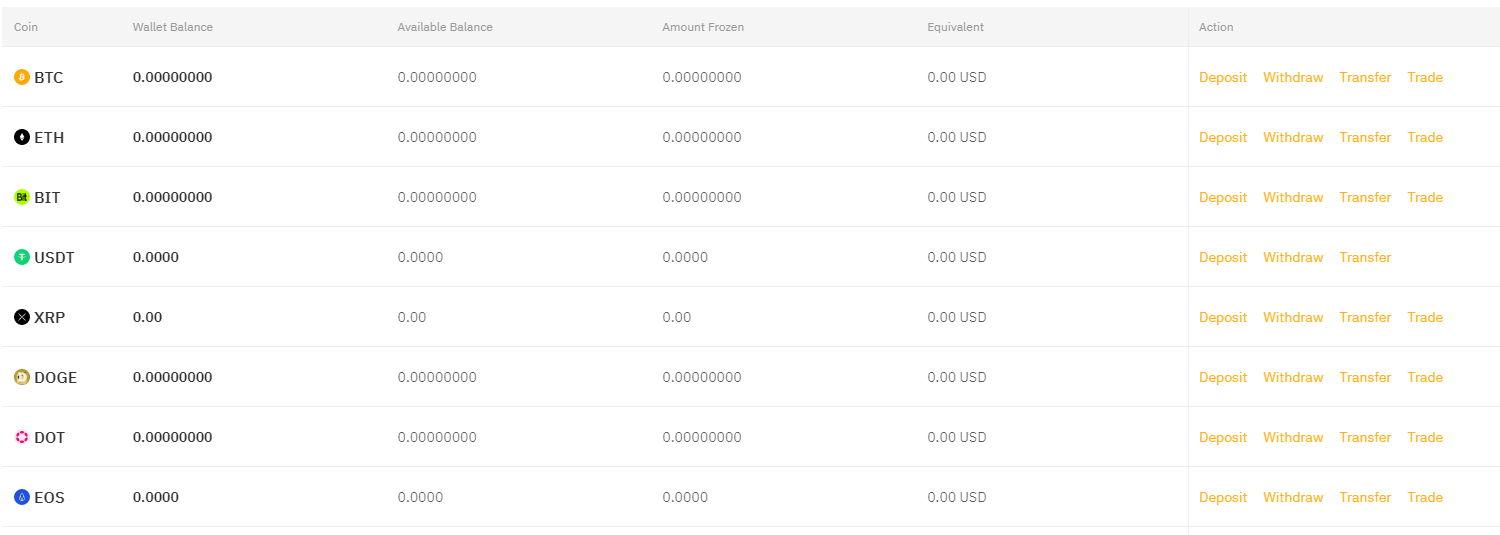
On the other hand, Coinbase allows users to deposit fiat using bank transfers, wire transfers, and debit cards. Certain residents can even connect their PayPal accounts to Coinbase for deposits and withdrawals or buy crypto with PayPal and Apple Pay by linking the accounts to the exchange. The platform accepts a large range of fiat currencies, including USD, EUR, GBP, AUD, and more.
Winner: Coinbase.
Coinbase has far more flexible deposit/withdrawal options than ByBit such as the ability to fund an account with multiple fiat currencies. However, ByBit’s deposit and withdrawal methods, albeit limited, are much cheaper and consistent across regions. What’s viable in one country will be viable in the next when using ByBit, while the same cannot be said of Coinbase.
ByBit vs Coinbase: Supported Cryptocurrencies
Coinbase has over 200 supported assets available, with even more that can be ordered through Coinbase Pro. The majority of altcoins listed support margin and derivatives trading and can be used to trade coin pairs. All the most popular coins can be accessed via Coinbase, including Bitcoin, Litecoin, and various stablecoins. However, investors looking for more obscure altcoins will likely need to consider a dedicated altcoin exchange such as KuCoin or Gate.io.
Bybit's list of supported cryptocurrencies is solid without being extraordinary. Users can “express trade” 17 virtual currencies in a process that is very similar to buying/selling crypto on Coinbase. Those using the advanced trading hub have access to 100+ trading pairs including perpetual and options contracts.
Winner: Coinbase.
Coinbase has approximately triple the number of supported cryptocurrencies that ByBit when it comes to buy crypto. That said, ByBit’s range of derivatives and margin trading markets are not available on Coinbsae which means ByBit has a far greater number of trading pairs for speculators.
ByBit vs Coinbase: Trading Volume & Liquidity
Coinbase is one of the highest-volume cryptocurrency exchanges, with a trading volume regularly exceeding $2 billion per day (at the time of writing). Even though Coinbase does not offer high-leverage trading, it does support a country-restricted derivatives exchange that allows users to take advantage of short-term price swings.
Similarly, Bybit is one of the market’s highest-volume cryptocurrency exchanges, generally seeing 24h trading volume of $1-2 billion. According to CoinMarketCap, the platform is in the top 20 exchanges sorted by liquidity score. Bybit is renowned for deep liquidity and extremely fast price updates, making crypto arbitrage trading strategies viable on the derivatives exchange.
Winner: Draw.
Coinbase offers superior liquidity and has a much greater trading volume than ByBit on its spot exchange. However, when it comes to derivatives, ByBit is unmatched in liquidity and is the superior day trading platform for crypto.
ByBit vs Coinbase: Earning Interest on Crypto
Both exchanges have ‘earn' programs that allow crypto enthusiasts to earn passive income on assets they own. True to form, Coinbase’s earning program is straightforward to navigate and use. However, unlike other parts of the exchange, Bybit's earning hub follows suit by being rather user-friendly too.
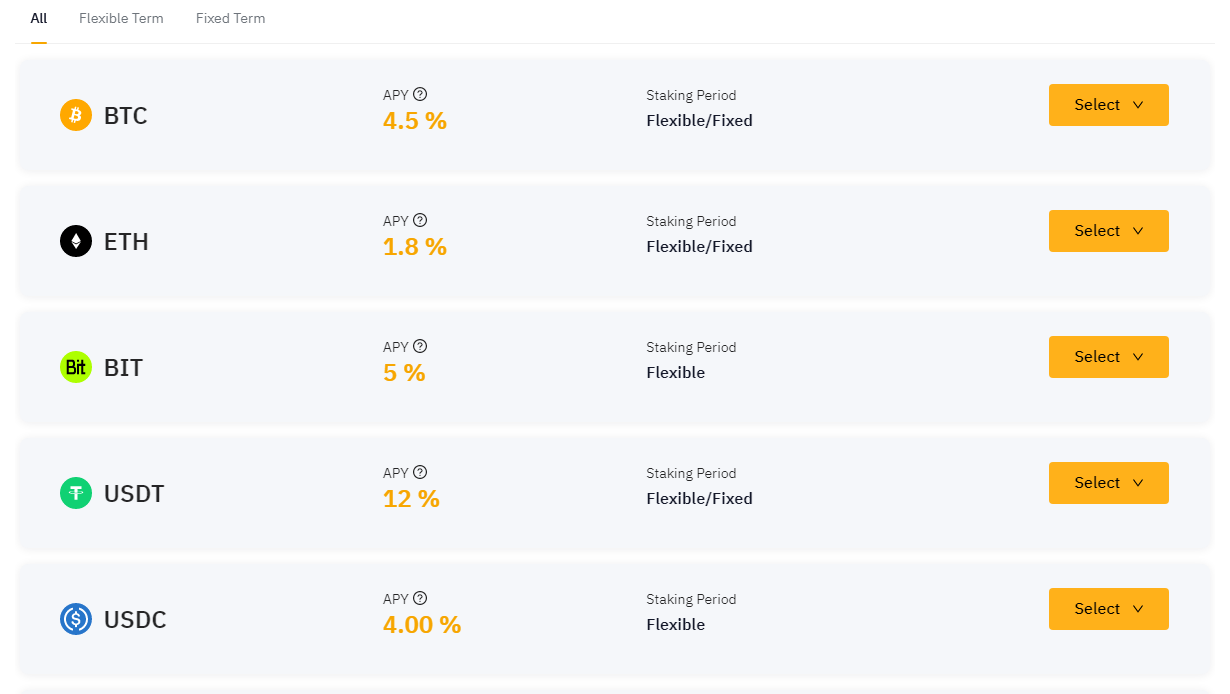
The Bybit earn feature is broken down into five sections – the most relevant being “Bybit Savings”. Investors can lock up their crypto for a certain timeframe to receive staking income. There are 22 cryptocurrencies available in this feature, including BTC, ETH, USDT, and ADA. The rates on offer, although variable, are rather impressive for certain cryptocurrencies, while disappointing for others. For example, users can stake Cosmo (ATOM) for a meagre 2.2%, while USDT accounts offer up to 12%.
Coinbase’s earn wallets only support seven coins – DAI, Tezos, Algorand, Cosmos, Cardano, Tether, and Solana. This list has some clear cryptocurrencies missing, such as Bitcoin and Ethereum. Some assets (particularly USDC and ADA) are location-restricted and only available to residents of 5-10 nations.
Winner: ByBit.
ByBit has a far greater list of assets that can be earned through its world-class staking platform. On top of that, the platform runs regular promotions that “boost” the earn rate of certain coins over a short duration. In contrast, the number of coins that can be staked on Coinbase is too limited.
ByBit vs Coinbase: Buying and selling NFTs
Bybit and Coinbase have introduced support for buying and selling NFTs by partnering with major players in the industry. Firstly, Bybit's NFT marketplace is missing the most popular, “blue-chip” NFT collections like CryptoPunks and Bored Apes. Instead, the platform regularly drops new, niche NFT collections that vary in quality and price. Users cannot mint their own NFTs on the Bybit marketplace without first contacting the development team.
However, Coinbase’s NFT marketplace is still in beta but supports a large variety of high-demand collections, like Terraforms (1.8k ETH daily volume) and pumpkins (658 ETH daily volume). In general, Coinbase sees a lot more volume, fresh drops, and high-profile collections on its NFT marketplace than most other exchanges with a dedicated NFT hub.
Winner: Coinbase.
Coinbase’s NFT marketplace is better organized and has more frequent drops, high-quality collections and overall liquidity than ByBit.
ByBit vs Coinbase: Ease of Use
When comparing Bybit and Coinbase’s ease of use, it is integral to remember that they are servicing totally different customer bases. Although professional traders want their platforms to be accessible and easy to use, this is secondary to having an excellent, industry-standard trading interface.
In general, Bybit's layout closely resembles the popular Binance exchange, and it is simple enough to find the platform’s various features and programs. Bybit also has a one-click buy and sell hub available to “express traders” (those who want to trade coins instead of margin contracts). That said, there is no doubt a large number of options available can make it overwhelming to traverse Bybit, especially for beginners. The design is a little clunky and not as decluttered as certain alternatives.

On the other hand, Coinbase is regarded as one of the most user-friendly exchanges on the planet. To facilitate the simple buying/selling of cryptocurrencies, Coinbase has a very basic interface that even the most technologically challenged will find suitable. Making a deposit and placing a market order can take fewer than five clicks, especially on the mobile app.
Coinbase is at its most intuitive and frictionless when used as a “buy and hold” exchange. Creating an account is simple enough, as is accessing the vast majority of the platform’s features. Although the advanced trading hub is much less intuitive, it is still fundamentally easy to place orders.
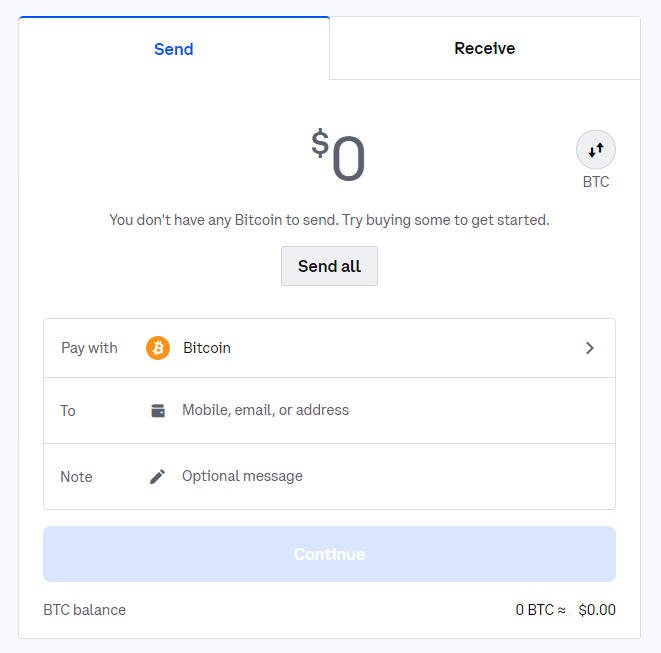
Winner: Coinbase.
The Coinbase platform prides itself on being beginner-friendly, while it is less of a priority for more experienced traders using ByBit. That said, Coinbase is still the clear winner and an excellent alternative to Bybit. It provides one of the most simple and aesthetically pleasing cryptocurrency exchanges out there.
ByBit vs Coinbase: Trading Experience
Bybit's trading interface is world-class. It is kept up-to-date with all the latest industry innovations and features a professional or amateur trader would desire. This includes incredibly low latency on price updates, a customizable chart, and impressive liquidity. Bybit customers can place long/short orders with up to 100x leverage on derivatives that are typically paired with USD stablecoins like Tether.
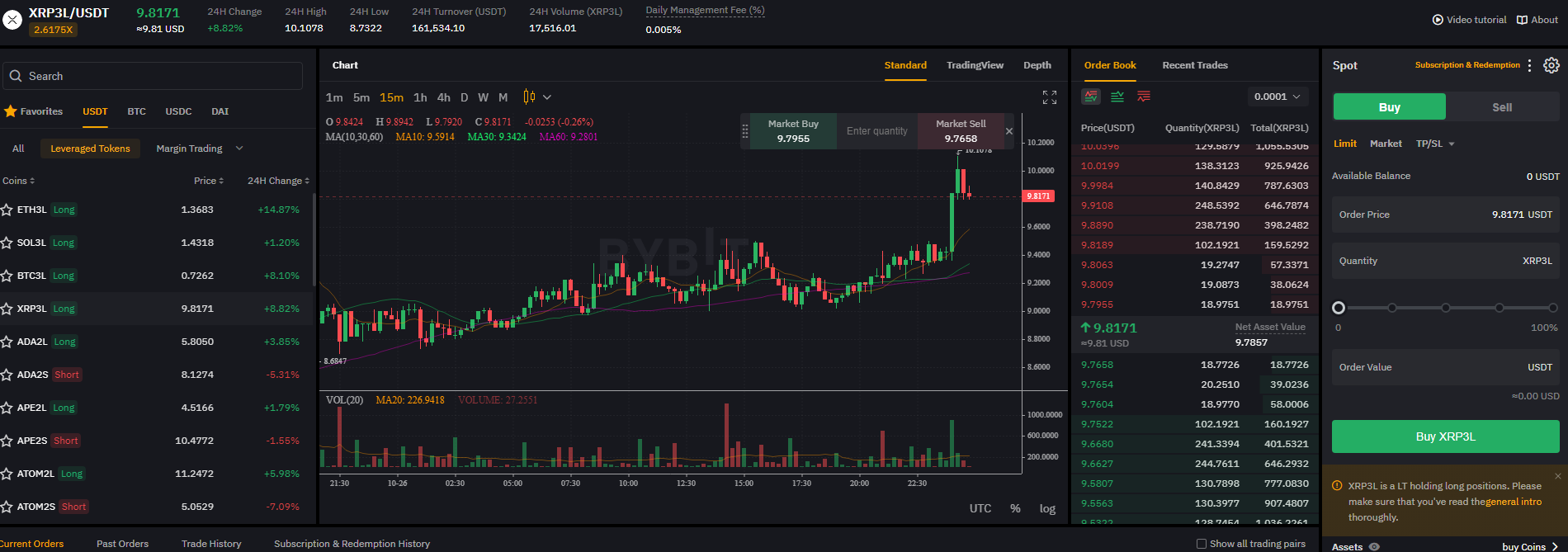
Bybit also has advanced order types available, such as take profit and stop loss. These can be tricky for newcomers to master, but with a little research, significantly increase risk-adjusted trade profitability. The platform even supports crypto trading bots, which can formulate and execute basic trading strategies automatically.
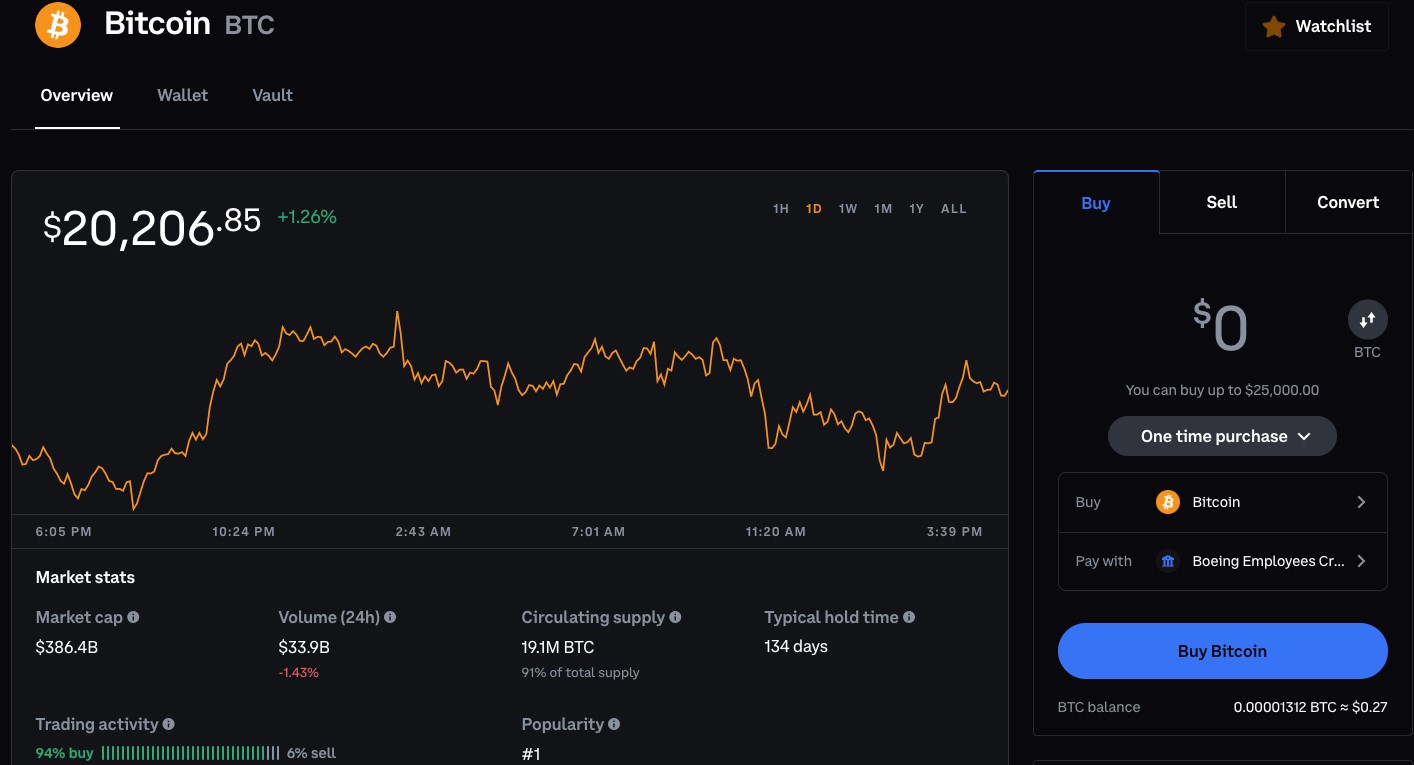
Coinbase’s trading experience is poor compared to ByBit. Both the mobile and web versions of the advanced trading hub are rudimentary and are stripped back of most features. Each asset’s trading page comes with a graph, background information on the coin, and the ability to place a couple of order types.
Winner: ByBit.
Coinbase’s main exchange isn’t built for professional trading, while ByBit’s is. Beginners will feel comfortable using Coinbase’s trading interface, but in general, it lacks the features and innovations one would expect from a modern crypto exchange. This is ultimately a symptom of each exchange’s target audience, rather than a significant oversight.
ByBit vs Coinbase: Trading Fees
Bybit is one of the few crypto exchanges without fees when it comes to spot trading. There are zero fees when buying or selling crypto for crypto. However, derivatives trades have even lower fees. Market makers start at a fee of 0.01%, which can go all the way down to 0 for high-volume accounts. Taker fees start at 0.06% and can be as low as 0.02%. Bybit doesn’t charge any deposit fees, which makes it a great choice for moving funds around. Withdrawing cryptocurrencies to a custodial wallet will incur a base network fee, which is standard for most exchanges.
In contrast, Coinbase’s fee structure is a lot more complex compared to ByBit’s, which is a downside considering the audience is mostly beginners who would prefer transparent fees. The platform charges a variable rate per trade, which can either be a flat amount or a percentage cut. In general, Coinbase does not publish their main exchange’s spot trading fees, which makes it hard to assess relative to the competition. However, users have reported the rates as being quite high (1.49%+).
Winner: ByBit.
ByBit is the winner as it is one of the cheapest exchanges with zero trading fees on its spot pairs and very competitive futures fees. Moreover, ByBit fees are a lot more transparent than Coinbase which is confusing to understand and vary per trade.
ByBit vs Coinbase: Mobile App
Bybit's app has both spot and derivatives trading available via the same interface, with more than 80 assets to choose from (spot and derivatives). All of the features you’d find in the desktop trading experience are present on the app as well, including a dynamic candlestick chart.
However, not all reviews are positive. Customers on the Google Play (3.8/5-star rating) and Apple App (3.9/5-star rating) Stores have complained about updates causing crashes and poor responsiveness in the ByBit app.
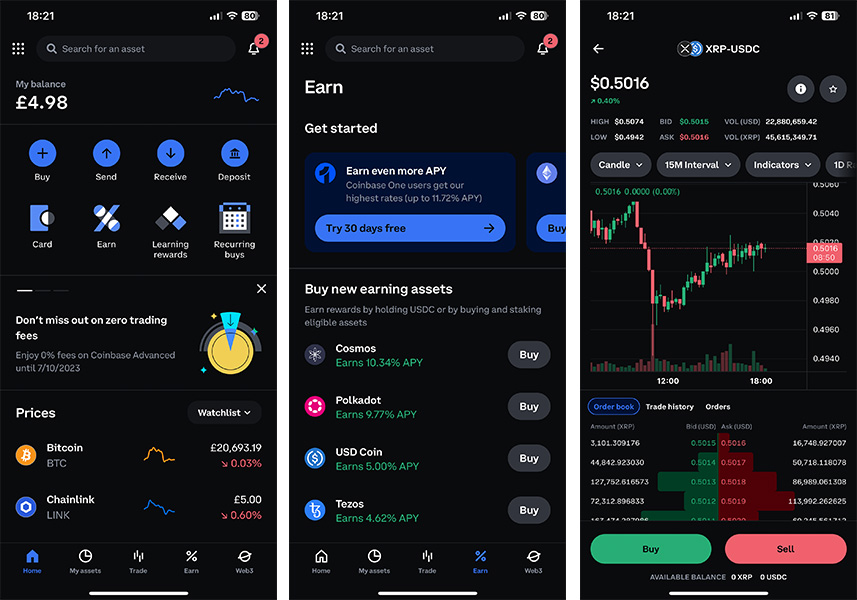
Coinbase, on the other hand, has two separate mobile apps, one for simple spot trading and one for advanced trading (including margin and derivatives). Both apps are fairly well-designed and provide all the bells and whistles featured on their respective desktop exchanges.
The main (spot trading) app has a user-friendly interface that is flawless for buying and selling cryptocurrencies with a few taps. It has been downloaded more than 1.7 million times from the Apple App Store and boasts an average 4.5/5 star rating across both Apple and Android users.
Winner: Coinbase.
Both exchanges have successfully implemented all major features from their desktop platforms to portable applications. However, Coinbase’s offering has the edge here with its very approachable spot trading app. The app has benefited from a larger user base and revenue, which has resulted in faster development of new features.
ByBit vs Coinbase: Security
Bybit stores users’ assets in a hot/cold wallet combination, which provides convenient and fast trading while providing protection against hackers. The management team also pledges 20% of its annual budget to maintain an insurance fund, as well as to audit and improve current security measures. Since its inception, Bybit has never had any public issues with hackers or security compromises. It is worth noting that the exchange is by and large unregulated, which certain investors may be wary of. However, Bybit is a reputable exchange with an excellent track record of security.
Coinbase has been operational for over a decade now and has only experienced very minor issues with the security of its customer’s funds. The platform stores a large portion of its funds in cold (offline) wallets, making it harder for hackers to access. The development team also has a proactive approach to protecting against digital fraud and keeps a large volume of digital assets in insurance coverage to ensure customers are compensated in the event of a major hack or loss.
In addition, Coinbase received ISO 27001 certification in 2021. This is a notoriously difficult achievement that demonstrates an industry-leading commitment to security and customer safety.
Winner: Coinbase.
Both ByBit and Coinbase have implemented effective security protocols that have kept customer funds safe and sound. However, Coinbase’s longevity, ISO 27001 certification and industry-leading security practices ensure it is a well-protected platform. ByBit performs admirably in this regard though, especially considering its relative youth.
ByBit vs Coinbase: Customer Support
ByBit’s reputation for customer support is solid, without being outstanding. The company uses a dedicated customer service portal on its website (chatbot, email, social media, and ticket support), which facilitates an approachable customer experience. There is also an extensive FAQ and educational resource section, written in simple and straightforward language. Unfortunately, ByBit’s customer support team isn’t always punctual with their replies, and the platform has a relatively weak score of 2.5/5 on TrustPilot. All up, the customer support is respectable with plenty of room for improvement.
Coinbase offers customer support via dedicated phone numbers (depending on region), 24/7 live chat, and email. The platform also has a FAQ section, with dozens of helpful and insightful answers to the most common questions customers ask. The company has also helped to pioneer and develop a massive online community for customer support. The /r/CoinBase subreddit has over 200k members and users will often offer their help free of charge. However, many customers have complained that, due to Coinbase’s massive user base, the support team is incredibly difficult to get in contact with. Coinbase currently has over 7,000 reviews on TrustPilot and has a terrible 1.6/5 score.
Winner: Draw.
ByBit’s support team is, in our experience, slightly easier to get in touch with compared to Coinbase’s. However, Coinbase is one of the world’s largest cryptocurrency exchanges and has resources available all across the internet – including communities throughout Reddit and telegram. Neither platform has an amazing customer support reputation and it is a little difficult to separate them.
Final Comparison Scores
To conclude this comparison of which exchange is better between ByBit and Coinbase, each crypto exchange has been scored using simple evaluation criteria as shown below.
| Comparison Criteria | Winner |
|---|---|
| Features, Products and Services | ByBit |
| Ease of Use | Coinbase |
| Trading Experience | ByBit |
| Trading Fees | ByBit |
| Mobile App | Coinbase |
| Security | Coinbase |
| Customer Support | Draw |
